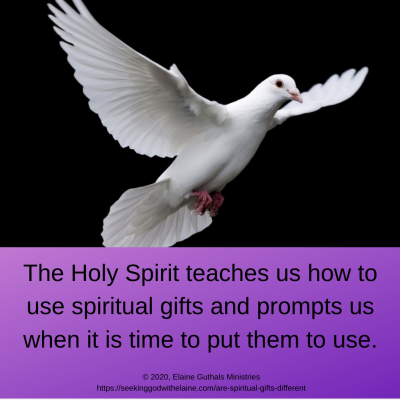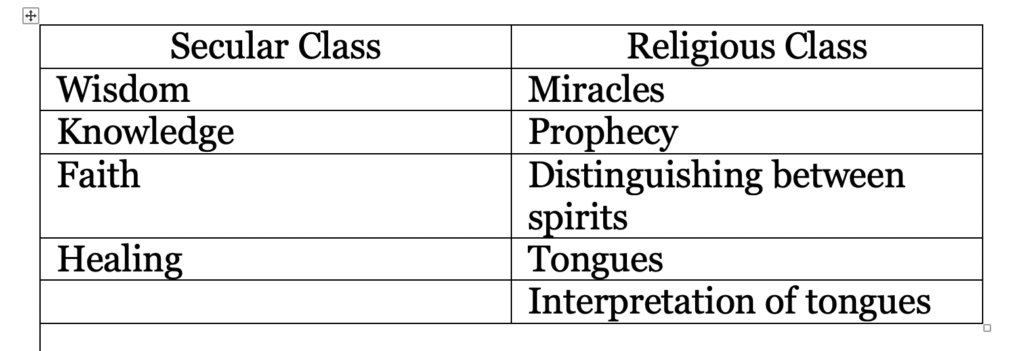Spiritual gifts come from God, but He does not give us all the same gifts or at the same level. This devotion looks at why gifts are different but yet the same.
Nuggets
- From the beginning, Jesus recognized the diversity of disciples.
- We can determine if it is a spiritual gift by its use for expanding God’s kingdom.
- Each disciple has been assigned a job to do — someone to whom they should witness.
Are Spiritual Gifts Different?
Collecting for Others

Equality is a real important word these days. At least it is to worldview people.
What does God think? Take spiritual gifts, for example. Does everyone get the same spiritual gifts? If they do, are they at the same level?
Let’s take a look.
Let's Put It into Context #1
The Merriam-Webster Dictionary defines cooperation as “the actions of someone who is being helpful by doing what is wanted or asked for” and “association of persons for common benefit.”
Resource
Let's Put It into Context #2
Spiritual gifts, according to the Holman Bible Dictionary, are “the skills and abilities which God gives through His Spirit to all Christians, which equip Christians to serve God in the Christian community.”
Jesus promised these gifts to His disciples. “And these signs will accompany those who believe: In my name they will drive out demons; they will speak in new tongues; they will pick up snakes; if they should drink anything deadly, it will not harm them; they will lay hands on the sick, and they will get well” (Mk. 16: 17-18 CSB).
Yeah, these are a little different than the ones Paul describes here, which we will get into in a second. Let’s just say Jesus promised His disciples would be given needed skills and abilities.
Paul knew people were going to have a lot of questions about spiritual gifts. These gifts given to disciples are to be used to grab the attention of non-believers (Liddon).
Liddon, Doris, and Riddell argued that these gifts no longer exist within the body of believers. It was felt the gifts are not needed because the church is now established. Riddell contended, though, that those gifts have been replaced by even better gifts.
Instead of spiritual gifts, Hodge called these graces of the soul. He described them as “… forms of ministering to Christ, or the effects of God’s power …”
Paul made it abundantly clear that these gifts, even bestowed on a variety of believers, came from one faith — faith in our Lord Jesus Christ.
One Ordainer
“Now there are different gifts, but the same Spirit. There are different ministries, but the same Lord. And there are different activities, but the same God works all of them in each person” (I Cor. 12: 4-6 CSB)
From the beginning, Jesus recognized the diversity of disciples. Still, He had one goal — save all of them from spiritual death.
Because of that diversity, Jesus gave us various ordinances. Ordinances are an expression of the disciples’ obedience.
Hodge explained it as we are given the Holy Spirit in different forms. It was God’s way of providing what we need.
These differences were not meant to divide us. Riddell wrote, “There is variety in unity.
Paul wanted to make one thing clear. They might have been diverse, but all gifts, ministries, and activities are to lead to Jesus.
We are not all cut out by the same cookie cutter because those we are witnessing to aren’t the same. God provides each person with what they need to witness to those they are assigned.
God does, though, give some of us the same gifts — just at different levels of development. That allows us to mentor and help each other as we grow to our full potential.
Bottom line is all of God’s children are given abilities. The Holy Spirit teaches us how to use them and prompts us when it is time to put them to use. But we need to be unified in their use.

One Work
“A manifestation of the Spirit is given to each person for the common good: to one is given a message of wisdom through the Spirit, to another, a message of knowledge by the same Spirit, to another, faith by the same Spirit, to another, gifts of healing by the one Spirit, to another, the performing of miracles, to another, prophecy, to another, distinguishing between spirits, to another, different kinds of tongues, to another, interpretation of tongues. One and the same Spirit is active in all these, distributing to each person as he wills” (I Cor. 12: 7-11 CSB)
Paul gives us a list of what these gifts are in First Corinthians 12: 7-11. They are the following:

I know. I think some of those are still in existence in God’s church today. But if you look at them, it is more the ones that Momerie calls the secular class. The ones in what Momerie calls the religious class seem to be more hidden from us these days.
We can determine if it is a spiritual gift by its use for expanding God’s kingdom. For example, some may become doctors for the money or the prestige. Others may feel called by God to make it their life’s work.
Using spiritual gifts means using them for the betterment of others. God wants us to help others improve morally.
Let’s say that a different way. We don’t get the gifts for ourselves. We receive gifts to be used for the church.
One important thing to point out is no one has all nine of the gifts — not even Paul. I don’t remember Scriptures saying that he spoke or interpreted tongues.
That means we have to cooperate and work together. The church must be one. “His mystical body, the Church, is like His natural body, or any of our bodies, in respect that although it is made up of many members, each having its own office, yet it is truly, strictly, mysteriously one. What makes it one, and binds it together, is the Holy Spirit of God dwelling in each person’s soul and body, to unite him truly to Jesus Christ.”
The diversity must be acknowledged and fostered. All of God’s children must be allowed to grow their gifts and use them in the manner to which God has called them.
One last thing. Paul noted that “a manifestation of the Spirit is given to each person …” (I Cor. 12: 12 CSB). The Spirit clearly shows us who God is. The bonus is the Spirit will never leave us. “‘And as for me, this is my covenant with them,’ says the LORD: ‘My Spirit that is upon you, and my words that I have put in your mouth, shall not depart out of your mouth, or out of the mouth of your offspring, or out of the mouth of your children’s offspring,’ says the LORD, ‘from this time forth and forevermore’” (Isa. 59: 21 ESV).
One Body
“For just as the body is one and has many parts, and all the parts of that body, though many, are one body — so also is Christ. For we were all baptized by one Spirit into one body — whether Jews or Greeks, whether slaves or free — and we were all given one Spirit to drink. Indeed, the body is not one part but many. If the foot should say, ‘Because I’m not a hand, I don’t belong to the body,’ it is not for that reason any less a part of the body. And if the ear should say, ‘Because I’m not an eye, I don’t belong to the body,’ it is not for that reason any less a part of the body. If the whole body were an eye, where would the hearing be? If the whole body were an ear, where would the sense of smell be?” (I Cor. 12: 12-17 CSB)
When we were walking through Ephesians, we talked about one body. If the body is the church, baptism changed them — and us — all into one body. That baptism into one body by the Spirit brings us unity through one Lord.
Paul’s analogy using a body to describe the body of the church is fitting. Jesus is the head of the body. His church makes up the body. The church must be unified as the human body is.
Each disciple has been assigned a job to do — someone to whom they should witness. If we do not do our jobs, the body does not grow as it should.
We are all doing the same work — witnessing — but in different ways. I may witness through my songs and these words. You may have someone over to your house.
The message is still the same — ABCD.
The ABCDs of Salvation
If you have not become a believer in Christ, please read through the
Plan of Salvation and prayerfully consider what God is asking you to do.
A – admit our sins
B – believe His Son Jesus is our Redeemer
C – confess God as Sovereign Lord
D – demonstrate that commitment by making any changes needed in our lives to
live the way in which God has called us
The Disciple’s Job Description
We can only accomplish the work that God has given us to do. He has equip us only with the skills we need.
If we would like to have a skill our brother has, we should encourage him. If our sister’s skill is more developed than ours, we need to complement her.
God didn’t set us up in competition. He set us up as a team.
Regardless of our denomination, God has placed all who have admitted their sins, believed in Jesus as Savior, and confessed Him as Sovereign God in the team. That is the only admission requirement to the team.

Making the Connections
Yes, we all have different gifts. Get over it. God has His reasons for doing that.
No, God doesn’t have to make us equal. No, He doesn’t have to explain Himself.
What does God make equal? Each and every gift is important. Every gift should lead to His kingdom being expanded.
Oh, yes. The gifts may have differing importance, but He wouldn’t accomplish what is planned if He had left even one out.
We may think the splashy gift of tongues is more important. Liddon said it isn’t. He said teaching and prophecy is more important.
No, God isn’t going for Hollywood splash. He would much rather we learn what we need to know to grow closer to Him.
Robertson also out things into perspective. He wrote, “It is far more important to ascertain that a man is a Christian than what sort of Christian he is.” What our gifts are doesn’t matter. They don’t make us more of less of a disciple.
But we need to have ABCDed.
Why do we feel encouraging is not a gift? It is probably one that is most needed.
Can you complement someone? Can you give a hug (once we can again)? Can you write a note? Type an email? Pat someone on the cheek?
Making the Connections to Self-Discipline
Some gifts we many have to keep using or we will use them. I am a first soprano. I used to could hit the high C6 and sometimes the high D6.
Now, I struggle sometimes to hit F5. Singing harmony, I don’t even get to try to go that high.
We have to keep ourselves disciplined when we are in between assignments to use our gifts. We can’t let them go — unless God is moving us to use a different gift.
How does all of this tie in with witnessing? Remember Momerie’s two classes. We may have difficulty convincing a worldview person that God also presents us with the secular one. What should we do?
We’ve been looking at defending our beliefs when we are witnessing. That means we have to be secure enough to convince someone to accept our beliefs.
Our questions should still serve us to determine on what we need to focus.
- What does the Scriptures say?
- What do I believe?
- Why do I believe the same/differently than the Scriptures?
- What are the talking points when witnessing to a non-believer?
Related Links
I have created a worksheet of the questions above. Click on the button below to access it.
How Do We Apply This?
Liddon made a really good point. What do we do with gifts? Keep them? No, we give them away. We can’t keep the gifts for ourselves. We have to use them to teach and support others.
What if we have high-powered gifts? What should we do? Robertson told us.
- Be humble.
- Have sympathy (I Cor. 12: 26)
We have to use our gifts responsibly for God’s purposes.
Father. You didn’t have to give us anything. You didn’t have to design the plan of salvation to restore our relationships with You. You didn’t have to give us spiritual gifts. But You did, and You do. We commit to using these gifts as You call us to use them. Amen.
What do you think?
Leave me a comment below (about this or anything else) or head over to my Facebook group for some interactive discussion.
If you don’t understand something and would like further clarification, please contact me.
If you have not signed up for the email daily or weekly providing the link to the devotions and the newsletter, do so below.
If God has used this devotion to speak with you, consider sharing it on social media.